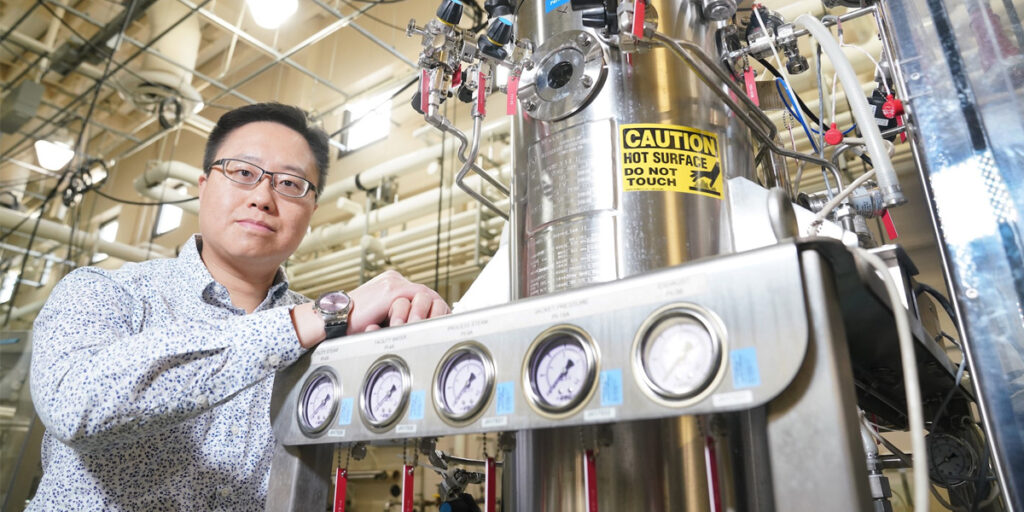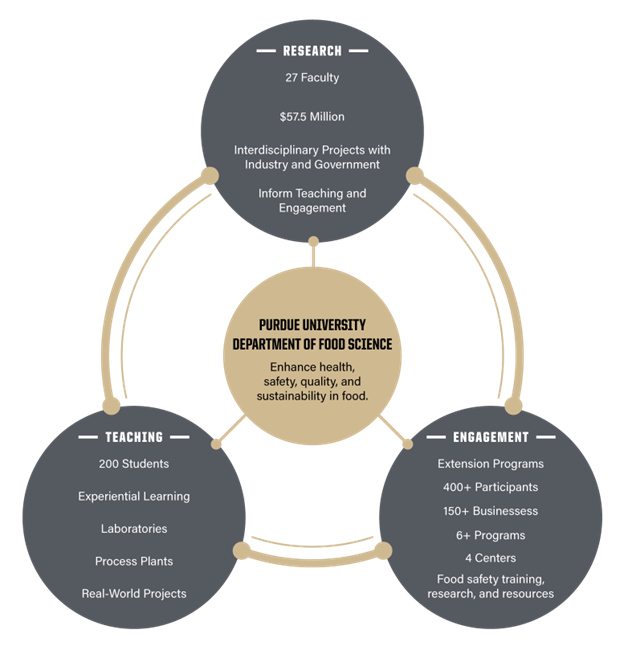Purdue University Department of Food Science: A Leader in Innovation, Education, and Industry Collaboration

Engagement is the collaboration between institutions of higher education and their larger communities for the mutually beneficial exchange of knowledge and resources in a context of partnership and reciprocity (Carnegie Foundation, 2008). Engagement can manifest in many ways and is a way to enhance and enrich discovery and learning outcomes with a specific focus on societal and broader impacts. Engagement is one of the mechanisms—in addition to discovery and teaching—through which the land grant mission is fulfilled and compels universities to serve their state, region, nation, and world.
The examples discussed below highlight engagement done with external partners and communities. Some activities may contribute to engaged scholarship while others may focus primarily on enhancing research broader impacts, student learning gains, or community empowerment. The Power of Engagement Profiles feature societal impacts that strengthen trust, build capacity, and increase the university’s relevance among the larger community.
Learn more about the Office of Engagement’s Protocol and Framework.
A Legacy of Excellence and Growth
Since its establishment in 1983, Purdue University’s Department of Food Science has been at the forefront of innovation, education, and industry collaboration. Originally formed from the existing Food Sciences Institute, the department was built on the vision of bridging the gap between agricultural production and value-added food products. Dr. Bernard Liska, then Dean of the School of Agriculture, recognized the importance of formalizing the food science discipline and appointed Dr. Philip Nelson, head of the Food Sciences Institute, as the department’s first head.
Today, the department has grown into a global leader in food science education and research, boasting over 200 students and 27 dedicated faculty members. As one of the 11 academic departments within Purdue’s College of Agriculture, it offers two distinctive majors—Food Science and Fermentation Science—along with three specialized minors: food science, fermentation science, and pet food processing. The department is home to the Whistler Center for Carbohydrate Research, the Food Entrepreneurship and Manufacturing Institute (FEMI), and two USAID Feed the Future Innovation Labs focused on food safety and post-harvest processing.
A Mission of Impact and a Vision of Innovation
The mission is clear: to enhance health, safety, quality, and sustainability in food while preparing the next generation of food science leaders while also addressing their stakeholders’ needs. With a vision to be a global leader in transforming lives through the science of food, the department plays a critical role in Purdue Agriculture’s goal to position itself as a local, state, national, and international leader in food, agricultural, life, and natural resource sciences.
Advancing Teaching, Discovery, & Engagement
The Department of Food Science integrates teaching, discovery, and engagement where students receive a well-rounded education by creating a comprehensive approach to education and innovation. This approach emphasizes experiential learning, preparing students for careers in food safety, food chemistry, microbiology, processing, and beyond. Whether it’s working in the state-of-the-art sensory laboratory, the processing pilot plant, or on real-world projects with the Food Entrepreneurship and Manufacturing Institute (FEMI), students gain valuable experience.
Research within the department is focused on four signature areas: food chemistry, structure, and function; foods for health; food safety and microbiology; and food processing. With over $57.5 million in research awards since 2015, Purdue Food Science has made groundbreaking contributions to the food industry. From studying the efficacy of food sanitizers to innovating in aseptic processing, the department’s discoveries have real-world applications. Undergraduate research is encouraged, with students engaging in projects that contribute directly to the food industry, making their learning practical and relevant. Faculty and students collaborate on interdisciplinary projects with industry and government agencies, ensuring that research informs both education and public outreach. One example is Dr. Amanda Deering’s research on cantaloupe safety, providing practical guidance to Indiana growers.
The past three years have seen several significant accomplishments for Purdue University’s Department of Food Science. The department along with its dedicated faculty and staff are working to advance the food industry through various initiatives that support entrepreneurs, manufacturers, and stakeholders.
Through its engagement and extension programs, Purdue University’s Department of Food Science is making a significant impact on the world. Faculty and staff work closely with food producers, entrepreneurs, and companies of all sizes, offering science-based training, research collaborations, and resources aimed at food safety, accessibility, affordability, and sustainability. Serving over 150 businesses and growers annually, the Department provides a wide range of services, including regulatory compliance training, workforce development, and entrepreneur assistance.
Key extension initiatives include the Food Entrepreneurship and Manufacturing Institute (FEMI), Retail Food Safety Program (ServSafe), Enology Extension, Safe Produce Indiana and Good Agricultural Practices (GAPs) for produce growers, and PCQI training for food processors. These programs along with partnerships with entities like the FDA further demonstrate the department’s impact in ensuring food safety and quality.
One of the flagship programs is the Aseptic Processing and Packaging Workshop, which has trained 400 professionals from 10 countries since 2017. The program, founded in the 1980s by World Food Prize laureate and department head Dr. Phil Nelson, is recognized globally for its role in advancing aseptic processing technology. Through initiatives like these, Purdue Food Science continues to integrate teaching, research, and community engagement, supporting industry growth and preparing students for success in the field.
Recognizing the need for a dedicated center to support food entrepreneurs and manufacturers, FEMI launched in 2022. The institute focuses on enabling food and beverage companies to develop, commercialize, and market new products. By leveraging the strengths of the Skidmore Product Development Lab and the Pilot Plant, FEMI addresses challenges in product development, sustainability, and commercialization. Since its establishment, FEMI has generated over $600,000 through various fee-based projects, secured a $1.5 million USDA grant, and completed 43 projects for clients ranging from large businesses to small entrepreneurs.
In response to changes to Indiana’s food safety regulations in 2022, Purdue’s Retail Food Safety Extension Program Team began offering ServSafe Food Handler training and certification. This initiative helps home-based vendors (HBV) comply with new food safety requirements. Additionally, funding was secured to research the food safety profiles of commonly produced HBV items. The results will inform a comprehensive guidance document, scheduled for release in late 2024, aimed at helping HBVs produce safe and legally compliant products.

A Commitment to the Future
As the Department of Food Science looks ahead, it remains committed to transforming lives—through groundbreaking research, experiential education, and meaningful industry partnerships. The department plans to continue its leadership in sustainability, data science, and entrepreneurship. FEMI will remain a focal point to help spur economic growth in the food industry. The department also plans to expand its offerings in scientific machine learning as well as online learning for undergraduate and graduate level courses, ensuring that Purdue remains at the forefront of food science education. The department will capitalize on its strong ties with industry as it continues to grow the Industrial Associates program. This program is a critical asset in helping students network and engage with industry leaders.
Through its unique integration of research, teaching, and industry engagement, the Purdue University Department of Food Science will continue to be a leader in food science for years to come. Its impact reaches beyond the university, enhancing the safety, quality, and sustainability of the foods we consume, and setting the standard for academic and industry collaboration.
Learn more about how Purdue Food Science is driving change.